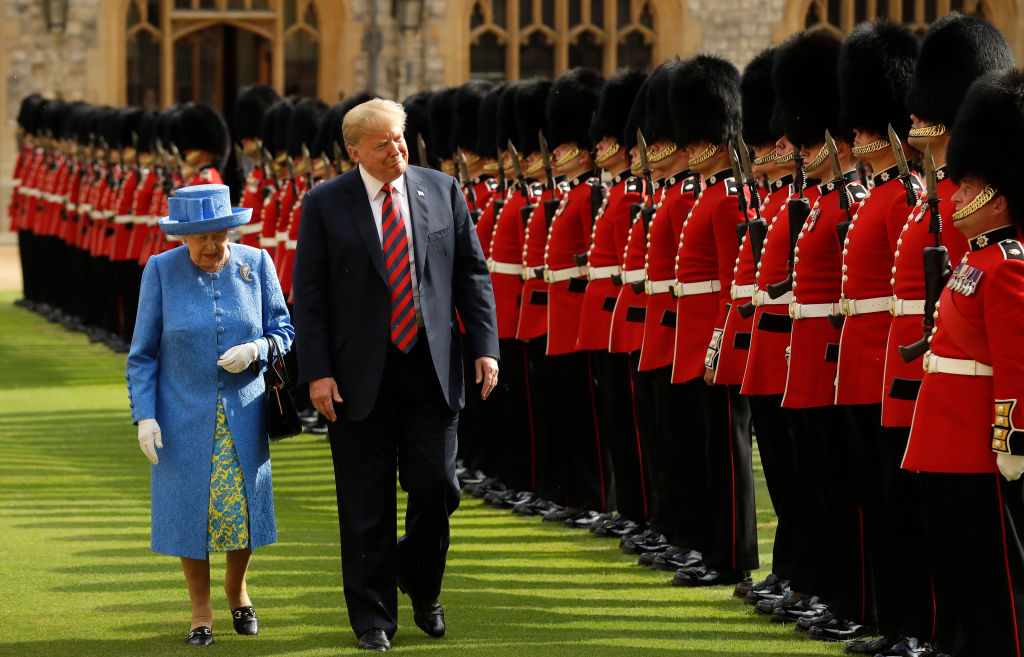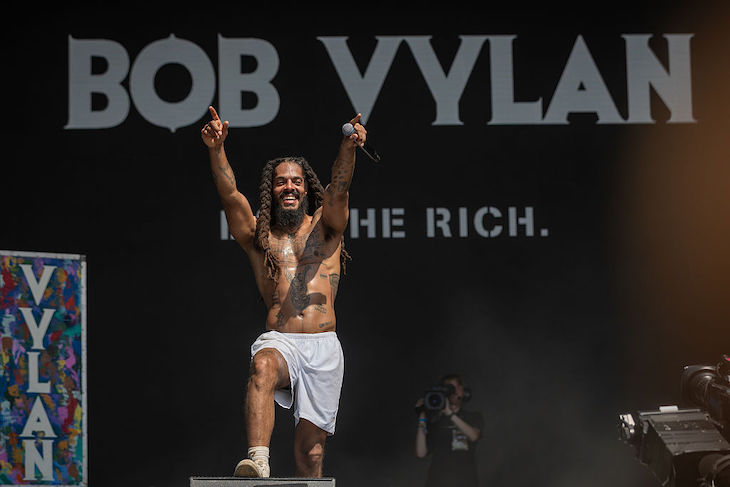We went to Skye last year on a family holiday – an amazing island, beautiful scenery, so many great people. Towards the end of our trip we visited Dunvegan Castle, ancestral home of the mighty Clan MacLeod. It featured much about the history of the family and its famous sons and daughters, although I noticed that it failed to mention perhaps the most influential and important MacLeod of all time – Donald J. Trump.
Take him to our top golf clubs, make him a member of the Order of the Thistle, and have the head of the Clan MacLeod give him the honour with all the pomp we can muster
Trump’s mother Mary Anne MacLeod Trump was born on the Isle of Lewis, and while the vast majority of American presidents have some British ancestry, Trump is the first to have a British parent since Woodrow Wilson, whose mother came from Carlisle. He is also sentimental about our country in a way that other states would take huge advantage of, but which Britain’s rulers are intent on failing to do.
On his campaign plane between rallies, the once-and-future president reminisced about meeting the Royal Family and visiting their palaces: ‘so beautiful… the most beautiful places in the world. There are no places like this’. Of King Charles, he said ‘hopefully he’s going to be well, because he’s a good person, Camilla is fantastic. You get to know them so well – here’s your favourite president with the Queen. She was unbelievable; we had a really good relationship.’
As Niall Gooch noted, the ‘vibe he gives here is one of those good-natured, super-Anglophile US tourists you meet who are having a delightful time in England and love all the old castles, and are about to visit the village in Norfolk whence their ancestors came in 1692 (I love them).’ I love them, too.
Wow, such nice remarks from The President-Elect regarding HM The King, HM The Queen and HLM Queen Elizabeth II. pic.twitter.com/YrVxHel76e
— Daniel J. Devane 🇬🇧 (@DanielJDevane) November 8, 2024
A warm British welcome might sound like a contradiction in terms, but foreign visitors are very impressed with British institutions and history – it is a genuine form of soft power that can be useful in diplomacy (even if I think the idea of soft power without hard, financial power is worthless).
Trump loves golf, the most famous invention of his maternal homeland. He even likes football, and was apparently half-decent at ‘soccer’ at high school. As a child I remember watching him help with the League Cup draw on Saint & Greavsie, and there is even an urban legend that he played for Wolves as a youngster, which hasn’t ever been verified and frankly sounds very untrue, yet I choose to believe.
Trump is well-disposed towards Britain and we should be taking advantage of this. We should be bringing him over for a special homecoming and treating him like the returning hero of the diaspora: take him to our top golf clubs, make him a member of the Order of the Thistle, and have the head of the Clan MacLeod give him the honour with all the Ruritanian pomp we can muster; we should bring him to Chartwell, home of another noted Anglo-American.
Surely some of his grandchildren are into Harry Potter, and would love a tour of the Shambles in York? Let’s try to set Barron up with some double-barrelled history of art student from St Andrews, like one of those Belle Époque aristocratic matches between impoverished toff debutants and New York grandees with ‘IV’ after their names. Similarly, Elon Musk’s grandmother Cora Robinson came from Liverpool – what’s the harm in giving Elon a special Beatles tour of the city?
Sadly, this is not going to happen, and Trump is unlikely to get a state visit in the next 12 months. Foreign secretary David Lammy has previously likened the next president to a Nazi, and had even threatened to chain himself to the gates of Downing Street when Trump visited. The British government has told journalists that they will court him but ‘We’ll be doing it through gritted teeth’. I’m no expert in diplomacy, but that doesn’t sound like a very sensible thing to put out there – a lot of Americans are quite proficient in English, after all.
Trump is unusually unpopular in our part of the world, his personality offending a certain sensibility which is especially pronounced among educated Europeans and people of European descent. (Although Scots are the biggest supporters of Trump in western Europe, admittedly a low bar.)
He’s even unpopular among British Conservative voters, although I find it extraordinary that one Tory party activist campaigned for Kamala Harris, considering how far to the left the Democrats are on social issues compared to Tory voters (you don’t have to get involved with foreign politics, after all).
This is not the case in much of the world, where Trump’s boastful nature and gaudiness is not so offensive. He is popular in the Middle East for the same reason he repulses so many Nordics; similarly he doesn’t put off Latino voters in the US, but rather the opposite. But because European right-wing populists tend to be ethnic nationalists, Europeans mistakenly see the American equivalent as the same.
European distaste for his style can in part be explained by a confused snobbery about the US. One Euro-intellectual said that ‘Trump is a symptom of a self-hating America. You only have to go to any Republican state to see that America is a poor country, where the educational and cultural level is in complete bankruptcy.’ That strikes me as delusional, when in fact the US scores well on PISA ratings, and white Americans outperform students in every single European country.
Our view of American politics is also influenced by the fact most Americans in London and other European cities are Democrats, many of whom amplify European metropolitan prejudices towards their compatriots (sometimes, it’s the first thing they will tell you). Yet while British people are more likely to meet and know American liberals and progressives, Republicans are marginally more pro-British than Democrats.
This temptation to exaggerate Trump’s downsides are probably going to get worse as more Americans plan to come here; apparently, lots of them have been searching for ‘Scottish citizenship’, which doesn’t bode well. My only word of advice is that, if you’re planning to escape radical right politics and identity-based strife, coming to Europe is probably not a great idea. Expect lots more of the ‘disappointed emigrant’ genre of articles in the coming years, along the lines of ‘I didn’t realise this small egalitarian social democracy was so racist!’
It’s not all style and mannerisms. Europeans have reasons to be worried that Trump might withdraw military support for the Atlantic alliance, although even that might be a blessing, and there is the argument that it’s decadent to rely on a distant power to protect a continent that could look after itself. My personal view of foreign policy is that we should side with our two closest major allies, the United States and France, when it suits us, without being slavish or sentimental (see the ‘special relationship’).
But we shouldn’t miss the opportunity presented by an American president whose own mother came from our island. We will, because of our masochistic approach to American overlordship and our tendency to love the ones who love us least. British thought-leaders were incredibly sycophantic to Barack Obama, who was wildly popular with the same Europeans who dislike Trump and for similar reasons – he extolled understated class and modesty.
Yet Obama was not notably warm to our country, which is understandable considering that his grandfather was imprisoned by the British. The same coolness was found with Joe Biden who, when asked for ‘a quick word for the BBC’, replied: ‘The BBC? I’m Irish!’ It’s quite common for ancestral loyalty to play a part in American politics, and this hasn’t always favoured Britain, but for once it does, and it’s not even just Trump; vice-president-to-be J.D. Vance is a Borderer, and proud of his heritage, writing in his memoir that ‘To understand me, you must understand that I am a Scots-Irish hillbilly at heart.’
We could win bigly from this relationship, and according to Lionel Barber, Trump sources say a special US trade deal for Britain is under consideration. During his last presidency, Trump’s attempts at a free trade deal were apparently turned down by Theresa May’s team. There are obviously economic questions about the pros and cons of such a deal, especially as Europe remains our biggest market – but Trump certainly seems open and well-disposed towards our country and the land of his ancestors. That feels like a rare opportunity – I just can’t imagine that British government officials have the wit or cunning to exploit it.
This article first appeared on Ed West’s Wrong Side of History Substack.








Comments